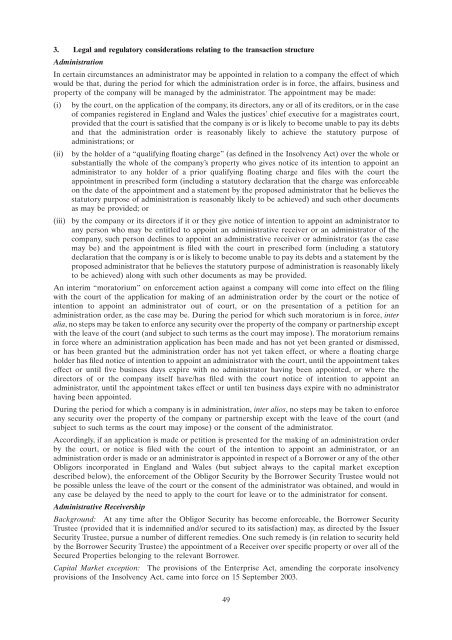LCP Proudreed PLC - Irish Stock Exchange
LCP Proudreed PLC - Irish Stock Exchange
LCP Proudreed PLC - Irish Stock Exchange
You also want an ePaper? Increase the reach of your titles
YUMPU automatically turns print PDFs into web optimized ePapers that Google loves.
3. Legal and regulatory considerations relating to the transaction structure<br />
Administration<br />
In certain circumstances an administrator may be appointed in relation to a company the effect of which<br />
would be that, during the period for which the administration order is in force, the affairs, business and<br />
property of the company will be managed by the administrator. The appointment may be made:<br />
(i) by the court, on the application of the company, its directors, any or all of its creditors, or in the case<br />
of companies registered in England and Wales the justices’ chief executive for a magistrates court,<br />
provided that the court is satisfied that the company is or is likely to become unable to pay its debts<br />
and that the administration order is reasonably likely to achieve the statutory purpose of<br />
administrations; or<br />
(ii) by the holder of a ‘‘qualifying floating charge’’ (as defined in the Insolvency Act) over the whole or<br />
substantially the whole of the company’s property who gives notice of its intention to appoint an<br />
administrator to any holder of a prior qualifying floating charge and files with the court the<br />
appointment in prescribed form (including a statutory declaration that the charge was enforceable<br />
on the date of the appointment and a statement by the proposed administrator that he believes the<br />
statutory purpose of administration is reasonably likely to be achieved) and such other documents<br />
as may be provided; or<br />
(iii) by the company or its directors if it or they give notice of intention to appoint an administrator to<br />
any person who may be entitled to appoint an administrative receiver or an administrator of the<br />
company, such person declines to appoint an administrative receiver or administrator (as the case<br />
may be) and the appointment is filed with the court in prescribed form (including a statutory<br />
declaration that the company is or is likely to become unable to pay its debts and a statement by the<br />
proposed administrator that he believes the statutory purpose of administration is reasonably likely<br />
to be achieved) along with such other documents as may be provided.<br />
An interim ‘‘moratorium’’ on enforcement action against a company will come into effect on the filing<br />
with the court of the application for making of an administration order by the court or the notice of<br />
intention to appoint an administrator out of court, or on the presentation of a petition for an<br />
administration order, as the case may be. During the period for which such moratorium is in force, inter<br />
alia, no steps may be taken to enforce any security over the property of the company or partnership except<br />
with the leave of the court (and subject to such terms as the court may impose). The moratorium remains<br />
in force where an administration application has been made and has not yet been granted or dismissed,<br />
or has been granted but the administration order has not yet taken effect, or where a floating charge<br />
holder has filed notice of intention to appoint an administrator with the court, until the appointment takes<br />
effect or until five business days expire with no administrator having been appointed, or where the<br />
directors of or the company itself have/has filed with the court notice of intention to appoint an<br />
administrator, until the appointment takes effect or until ten business days expire with no administrator<br />
having been appointed.<br />
During the period for which a company is in administration, inter alios, no steps may be taken to enforce<br />
any security over the property of the company or partnership except with the leave of the court (and<br />
subject to such terms as the court may impose) or the consent of the administrator.<br />
Accordingly, if an application is made or petition is presented for the making of an administration order<br />
by the court, or notice is filed with the court of the intention to appoint an administrator, or an<br />
administration order is made or an administrator is appointed in respect of a Borrower or any of the other<br />
Obligors incorporated in England and Wales (but subject always to the capital market exception<br />
described below), the enforcement of the Obligor Security by the Borrower Security Trustee would not<br />
be possible unless the leave of the court or the consent of the administrator was obtained, and would in<br />
any case be delayed by the need to apply to the court for leave or to the administrator for consent.<br />
Administrative Receivership<br />
Background: At any time after the Obligor Security has become enforceable, the Borrower Security<br />
Trustee (provided that it is indemnified and/or secured to its satisfaction) may, as directed by the Issuer<br />
Security Trustee, pursue a number of different remedies. One such remedy is (in relation to security held<br />
by the Borrower Security Trustee) the appointment of a Receiver over specific property or over all of the<br />
Secured Properties belonging to the relevant Borrower.<br />
Capital Market exception: The provisions of the Enterprise Act, amending the corporate insolvency<br />
provisions of the Insolvency Act, came into force on 15 September 2003.<br />
49

















